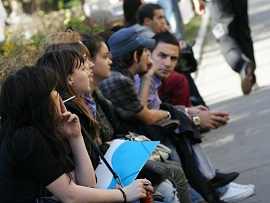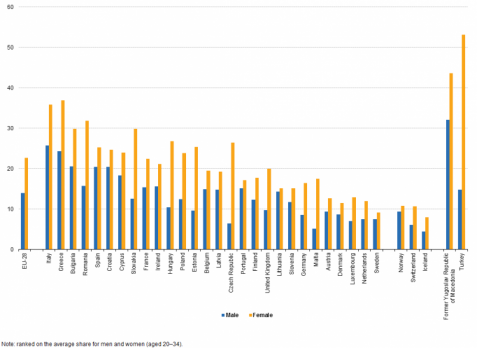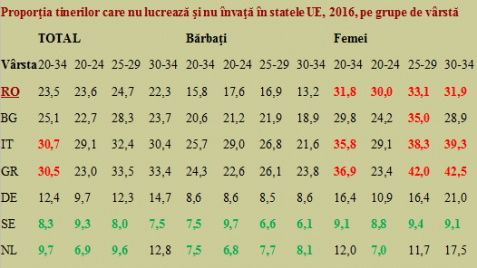
Romania ranked fourth in the EU in 2016 by the proportion of young people (20-34) who are neither employed nor included in a form of education, with the percentage of 23.5%, according to the data provided by Eurostat.
More seriously, we are among the countries where this indicator has deteriorated the most over the past ten years.
Abbreviated NEET in English (neither in employment nor in education or training), the indicator provides essential information on the way people are transitioning to a productive activity and focuses on the number of young people who are not in the education process nor on the labour market.
The graph below – Proportion of young people who do not work and are not in the education process in the EU countries, 2016:
 We note that the age range of 20-34 years has been chosen by the EU statistical body because it has been considered that the clear majority of those in the 15-19 age group, although able to work legally, continue to participate in a form of education (formal or non-formal), the percentage at the EU level being 90.2%.
We note that the age range of 20-34 years has been chosen by the EU statistical body because it has been considered that the clear majority of those in the 15-19 age group, although able to work legally, continue to participate in a form of education (formal or non-formal), the percentage at the EU level being 90.2%.
*
- Proportion of young people who do not work and are not in the education process in the EU, by age groups
- Total Men Women
- Age
*
We have also selected countries with big problems in the field and those in which not being integrated into the labour market and not being in a form of education is a rarity, like the Nordic countries. This explains the success of these economies compared to the least developed countries from the southern part of the continent, where the problem primarily comes from the social consciousness and then from the strictly economic considerations.
In 2016, almost one in three Italian youngsters aged 20-24 were neither employed nor enrolled in one form of education, one in four in Romania (23.5%), Greece (23.0%) and Bulgaria (22.7%) and about one in five in Spain (21.2%) and Croatia (19.6%). Although we rank fourth overall by the NEET indicator, the trend appears to be worrying as we are on the 2nd position in the 20-24 age category, with a relatively rapid deterioration from the seventh position in the 30-34 age group and the fourth position in the 25-29 age group at the EU level.
For reference, it should be emphasised that in countries experiencing big problems in terms of integrating young people into the labour market, such as Italy, Spain or Greece, the 20-24 age group posts significantly lower values of this indicator, which means that efforts have been made to improve the situation.
In these countries, young people have better understood the importance of integrating into productive activity or improving their education compared to the previous generations. In our country, it is exactly the opposite, which should give food for thought to decision-makers. With the implementation of rapid measures that would reverse the trend we have entered and leads us to the top of the European ranking of the non-involvement of young people in productive activities.
It should also be mentioned that Romania is also characterized by a high discrepancy between men and women in the inactivity indicator for NEET young people, with the men at similar levels with developed economies (for instance, at the same level as Germany in the 20-24 age group, 50.6%).
But with the proportion of inactive women at extremely high rates, on the second position in the 20-24 age group after Bulgaria (79.4% in our country compared to 82.2% at the south of the Danube) and the first position in the EU in the 30- 34 age group, with a shocking 90.0%. That is, above the Hungary (89.8%), the Czech Republic (88.9%) or the United Kingdom (86.2%) and well above the levels recorded in Greece (40%), Portugal (43.9%) or Spain (44.7%).










